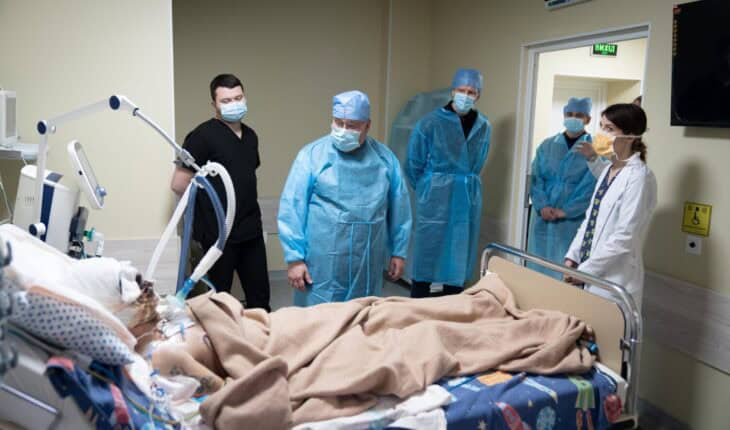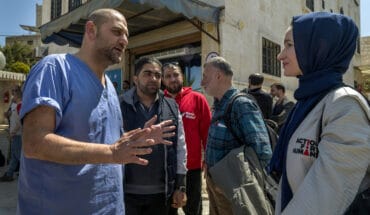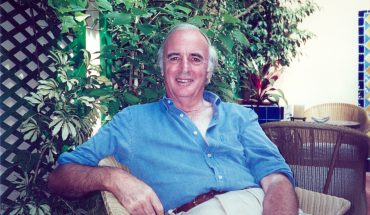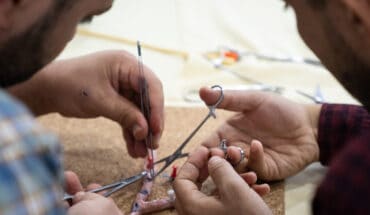Travelling through Ukraine, its overwhelming cultural power is palpable and unavoidable. No amount of challenges, obstacles and setbacks, as evil as they might be, seem able to hold this nation back.
At the beginning of Russia’s full-scale invasion in 2022, our Co-Founder David Nott was one of the first foreign surgeons on the frontline. Kharkiv surgeon Prof Kyrylo recalls the reaction of his hospital directors, upon learning of the rumoured arrival of the world’s most famous war surgeon. “We do not need this so-called ‘expert’.’’ Prof Kyrylo knew that not to be the case. “I risked my head to get him into my Operating Room. I knew we needed him. I knew we had a fixed mindset in Ukraine. He changed us and so many owe their lives to him.”
In those early days of the full-scale invasion, David would operate with Prof Kyrylo and teach teams of surgeons whenever time allowed. Three years on, the Foundation has run 24 courses and trained 769 surgeons and anaesthetists in Ukraine. 15 of those Ukrainian doctors are now established David Nott Foundation faculty, delivering our courses alongside our teams of international faculty. This life-saving knowledge now has the opportunity to stay and to grow exponentially across all corners of this extraordinary nation.
My visit to Ukraine this week was focused on both the significant challenges of the present, and what the next decade will hold. I wanted to better understand how our Foundation can support the Ukrainian doctors, ministries, and medical institutions into the future. In essence, how can we ensure the knowledge cultivated within our foundation is shared over the next decade in such a way that allows Ukrainian doctors and hospitals to have the skills and resources to be self-sufficient? For this surely should be the long-term intention of all those in international development, wherever we work.
Not by design, my week in the country coincided with the much-publicised cuts to global health budgets. The immediacy of their effect was extraordinary to witness. Global health is a web of dependencies. Each link in the chain a vital but vulnerable connection. In Ukraine, the vast majority of these links rely at least in some capacity on the budgets of the WHO.
At a burns centre in central Ukraine, we visited a soldier who had sustained catastrophic burns to his face and his lungs. His life had been saved by the doctors there, three of whom had been trained by the David Nott Foundation. The soldier’s face no longer looked like a face. A charred, expressionless surface, with a tube going through a hole that was once a mouth. The tube connected to a machine that was breathing for him. The machine was donated by funding routed through the WHO. Each of these machines requires disposables, maintenance and expert knowledge to keep it going. It is now uncertain whether this machine can continue to be used, given the funding cuts that haven taken place this week. Pulling funding could mean pulling breathing tubes from the critically unwell soldiers and civilians injured in this war.
In 2023 we collaborated with the WHO in Ukraine for the first time. They saw the massive influence on surgical practice that our courses were having. They wanted us to do more. We have since delivered five courses with their funding assistance. Six more courses are scheduled for 2025. Courses that will train 180 doctors. The WHO informed us on Wednesday that the funding for these courses has been paused. This was not just a meeting with an international NGO. This was a meeting with Ukrainians fighting for their freedom and the health of their nation, using the power and solidarity of the international community to save the lives of injured soldiers and civilians. After our meeting I called my WHO colleague in Syria. His answer to my question about ambitious joint plans for this year in Syria was, by this time, inevitable: without funding, the David Nott Foundation can continue to support doctors and hospitals with our life-saving training, but not at the scale that these global crises demand.
Over dinner, a Ukrainian General reminded me of Winston Churchill’s quote:
“Gentleman, we have run out of money; now we have to think.”
We are blessed at the David Nott Foundation to have the support of so many extraordinary donors. We are not as vulnerable as many of the NGOs around the world. We can and will do a lot with what we have. But making a lasting change happen at scale may take longer. We are just one connection in a delicate balance of competing interests. If the global health community does not act fast to establish a new normal, breathing tubes, real and metaphorical, will have to be pulled out.
With Gratitude,
Dr James Gough, CEO
- Ukraine: the significant challenges of the present and what the next decade will hold - 13th February 2025
- Funding a Palestinian doctor for paediatric trauma training - 3rd February 2025
- Addressing the crisis in conflict healthcare - 6th October 2024






